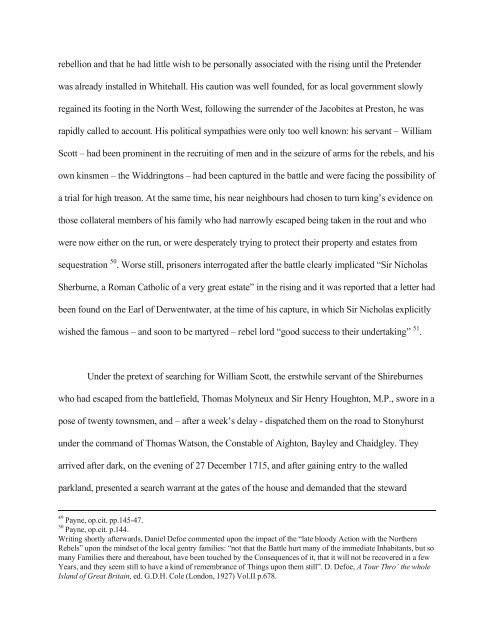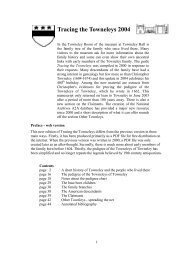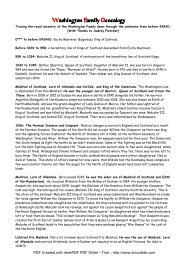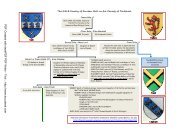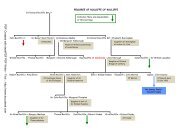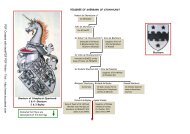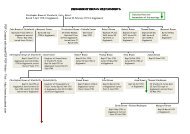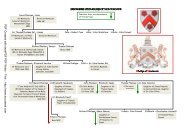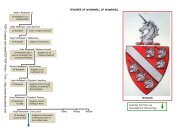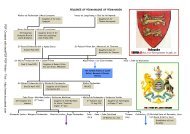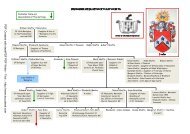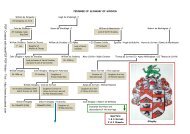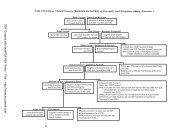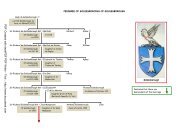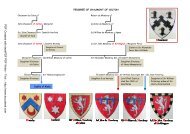SHIRBURNS of Stoneyhurst.pdf - Ingilby History
SHIRBURNS of Stoneyhurst.pdf - Ingilby History
SHIRBURNS of Stoneyhurst.pdf - Ingilby History
You also want an ePaper? Increase the reach of your titles
YUMPU automatically turns print PDFs into web optimized ePapers that Google loves.
ebellion and that he had little wish to be personally associated with the rising until the Pretender<br />
was already installed in Whitehall. His caution was well founded, for as local government slowly<br />
regained its footing in the North West, following the surrender <strong>of</strong> the Jacobites at Preston, he was<br />
rapidly called to account. His political sympathies were only too well known: his servant – William<br />
Scott – had been prominent in the recruiting <strong>of</strong> men and in the seizure <strong>of</strong> arms for the rebels, and his<br />
own kinsmen – the Widdringtons – had been captured in the battle and were facing the possibility <strong>of</strong><br />
a trial for high treason. At the same time, his near neighbours had chosen to turn king’s evidence on<br />
those collateral members <strong>of</strong> his family who had narrowly escaped being taken in the rout and who<br />
were now either on the run, or were desperately trying to protect their property and estates from<br />
sequestration 50 . Worse still, prisoners interrogated after the battle clearly implicated “Sir Nicholas<br />
Sherburne, a Roman Catholic <strong>of</strong> a very great estate” in the rising and it was reported that a letter had<br />
been found on the Earl <strong>of</strong> Derwentwater, at the time <strong>of</strong> his capture, in which Sir Nicholas explicitly<br />
wished the famous – and soon to be martyred – rebel lord “good success to their undertaking” 51 .<br />
Under the pretext <strong>of</strong> searching for William Scott, the erstwhile servant <strong>of</strong> the Shireburnes<br />
who had escaped from the battlefield, Thomas Molyneux and Sir Henry Houghton, M.P., swore in a<br />
pose <strong>of</strong> twenty townsmen, and – after a week’s delay - dispatched them on the road to Stonyhurst<br />
under the command <strong>of</strong> Thomas Watson, the Constable <strong>of</strong> Aighton, Bayley and Chaidgley. They<br />
arrived after dark, on the evening <strong>of</strong> 27 December 1715, and after gaining entry to the walled<br />
parkland, presented a search warrant at the gates <strong>of</strong> the house and demanded that the steward<br />
49 Payne, op.cit. pp.145-47.<br />
50 Payne, op.cit. p.144.<br />
Writing shortly afterwards, Daniel Defoe commented upon the impact <strong>of</strong> the “late bloody Action with the Northern<br />
Rebels” upon the mindset <strong>of</strong> the local gentry families: “not that the Battle hurt many <strong>of</strong> the immediate Inhabitants, but so<br />
many Families there and thereabout, have been touched by the Consequences <strong>of</strong> it, that it will not be recovered in a few<br />
Years, and they seem still to have a kind <strong>of</strong> remembrance <strong>of</strong> Things upon them still”. D. Defoe, A Tour Thro’ the whole<br />
Island <strong>of</strong> Great Britain, ed. G.D.H. Cole (London, 1927) Vol.II p.678.


